Welcome to today’s edition of ShentonSTAGE Daily.
BROADWAY IN LONDON AND LONDON ON BROADWAY
Tomorrow the Donmar Warehouse offers the UK premiere of THE BAND’S VISIT — winner of the 2018 Tony for Best Musical (but in a non-replica production that will see Donmar artistic director Michael Longhurst at the helm); meanwhile, this week sees two West End hits transfer to Broadway: this past Sunday, Tom Stoppard’s LEOPOLDSTADT opened there at the Longacre, and this coming Sunday Wendell Pearce and Sharon D Clarke reprise their London performances in the revival of DEATH OF A SALESMAN that began its life at the Young VIc, opening at the Hudson.
In a busy week of Broadway openings, there’s also the Broadway bow for a third play, COST OF LIVING, that originally premiered at MTC’s off-Broadway HQ at City Center in 2017 and subsequently won the Pulitzer prize for drama. It returned, partially re-cast, to open at the same company’s Samuel J Friedman on Monday; and a revival of 1776 — a show that won the Best Musical Tony in 1969 — opens at Roundabout’s American Airlines tomorrow.
I caught the last two in preview when I was in New York last month, and of course saw the first two in the original London runs, so I feel ahead of the game (for once). (I’d have been even further ahead of the game if I’d seen the UK premiere of COST OF LIVING at Hampstead Theatre in early 2019, but it entirely passed me by; I don’t even recall registering it had been on, even though the company included Adrian Lester).
The coming months will also see transfers from Broadway to London for Daniel Fish’s radical make-over of Rodgers and Hammerstein’s OKLAHOMA! (already seen at the Young Vic, but now transferring to Wyndham’s in February); AIN’T TOO PROUD — The Life and Times of the Temptations (going to the Prince Edward in March); and new London incarnations of Disney’s NEWSiES, seen on Broadway in 2012, and now set to be staged anew at Troubadour Wembley Park in November and George Takei’s 2015 autobiographically-inspired ALLEGIANCE, at Charing Cross Theatre in January. Full details can be found in my regularly updated feature of future openings in London, selected regional theatres and Broadway: https://shentonstage.com/theatre-openings-from-w-c-october-3/
And heading from the West End to Broadway will be Andrew Lloyd Webber’s CINDERELLA (newly retitled BAD CINDERELLA, see below) in February, and Sondheim and Furth’s MERRILY WE ROLL ALONG will return to New York (to open at Off-Broadway’s New York Theatre Workshop in November) in a production first seen at London’s Menier Chocolate Factory and subsequently the Pinter.
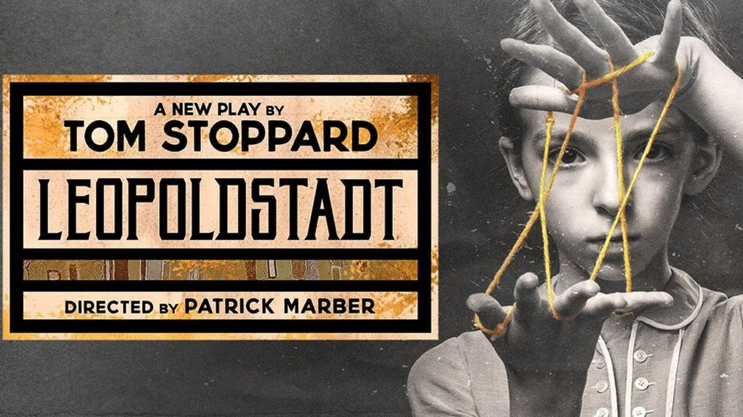
In 2020, Stoppard stated that LEOPOLDSTADT was likely his valedictory play: interviewed on Radio 4 (and reported by The Guardian) he said, “I am slowing up. This one took longer to write. And the other thing is, what on earth can you write about after that? When I finished Leopoldstadt I thought, ‘I can’t go through all that again’. Four years tend to go by between my plays, so I will be 86 or 87 before I write another, and I wondered whether people who are 87 do have plays on. It seemed a bit implausible.”
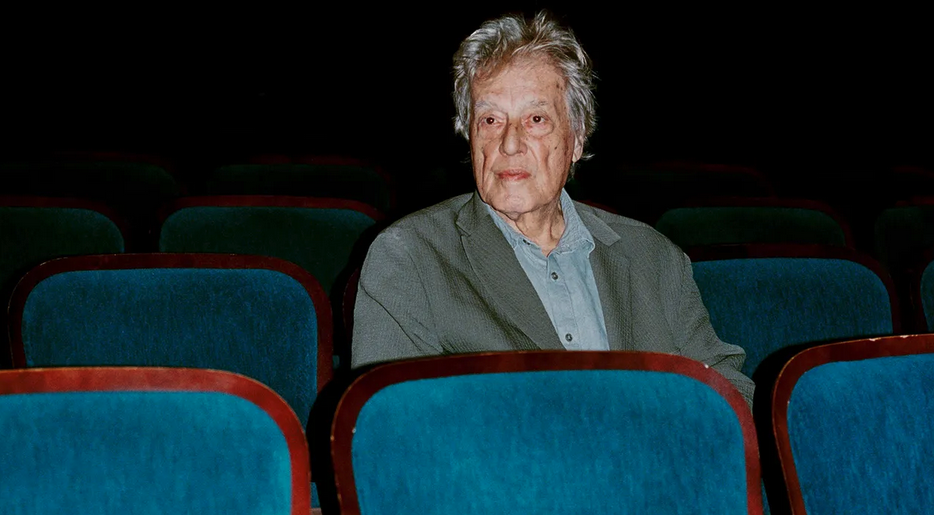
But in a more recent interview in the New Yorker with Andrew Dickson, he hinted this may not be true.
“I have family to love and be loved by, so it seems not the most tactful thing to say, but in a way it is one’s work which makes one’s life purposive. I don’t get enough energy out of being a father and a grandfather. I am a writer; I’m lucky to be a writer; I don’t want to stop being a writer. And when I finished Leopoldstadt I was really glad that there was a possibility that if I did not write another play—I was really glad about the fact that I’d finished on a big thing. It struck me as a good idea to retire at that point, so I would not end up, in my twilight years, writing miniatures. And I might not yet have escaped that fate, because I’d rather write in miniature than nothing. Without going into what the new play might be about, because I don’t know, there’s a play I wrote a long time ago about a moral philosopher, and moral realism, called Jumpers. I wrote it as a comedy, did it fast. I’d like to write—not that play again, but I’d like to write about that again, in a different way. That’s the only idea at the moment. I don’t have the energy I used to have, so it’s only one writing shift a day, and when there are rehearsals there are no writing shifts at all. I’m very good at not writing.”
In another interview in the New York Times, Maureen O’Dowd complimented him on his screenplay for Shakespeare in Love, and he replied saying it was a great experience, but he did not want to work on any more movies “because I’m a playwright, and if I have a play to write, that’s all I want to do.”
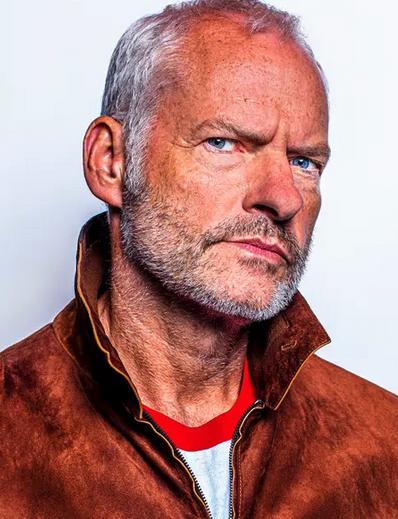
That’s a contrast to Martin McDonagh (pictured above), who made his name in the theatre in the 90s, but has now switched his priorities to film, as he stated in an interview in The Observer last Sunday. Miranda Sawyer writes, “The writer-director is 52 now, and recently made the decision that he’s going to spend what creative time he has left – he reckons “around 25 years” – making films rather than plays. His reasoning? Films are quicker.”
Sawyer quotes him explaining,
“I always used to think they took longer than plays, but with this one we were filming it a year ago, and now it’s out. But if you’re lucky enough to have successful plays, which I have been, then they start off-West End, like at the Royal Court, then you go to the West End, then to off-Broadway, and then to on Broadway. And to get that right with each move, to cast it and take care of it, go to rehearsals, that’s five years of your life.”
If McDonagh seems unduly impatient, Stoppard’s own story proves how playing the long game can pay off creatively. Whether LEOPOLDSTADT turns out to be Stoppard’s last play or not, its success is testament to a career spent mainly in the theatre, and it additionally serves to unpick the complexity of his own autobiography as someone who only found out his own Jewish heritage when he was in his 50s.
In the New York Times, he revealed how he came to find out about it: in 1993, he met a cousin who lived in Germany, called Sarka Gauglitz. “There was this weird scene where I said to Sarka, ‘How Jewish are we?’ and then she said, ‘What? You’re Jewish.’ I said, ‘Yes, yes.’ I was embarrassed. So I’m kind of going, ‘Yes, I know I’m Jewish, but how?’ So she then drew this family tree.”
She told him that his four grandparents had perished at the hands of the Nazis and his mother’s three sisters had died in Auschwitz and another camp. He then tells Maureen O’Dowd, “I was totally poleaxed. I was in my 50s. I’d had this entire life. I couldn’t change it retroactively even in my mind. So it wasn’t like some kind of new start. I just carried on being the person I was.”
But he then read Croatian writer Daša Drndić’s novel Trieste. As O’Dowd says, “One of the characters rips into real-life people, including Stoppard and Madeleine Albright, saying they took too long to discover their family history, calling them “blind observers” who played it safe.” And Stoppard tells O’Dowd in turn: “Basically, she was saying, enough already with the charmed life, you had this family, which you seem to have forgotten. And I thought that was completely legitimate and an intelligible thing to say. And I think it had a lot to do with choosing to write about it.”
One work of art encouraged him to create another that movingly explores his own history. And it’s something my own life resonates with, too: I made a similar discovery to Stoppard when I was in my early 40s. I was in New York with my mother in 2001, and said to her one day: why do so many of my New York Jewish friends think that I am Jewish?
She replied that she would tell me one day. I pressed her to tell me then and there. And she did. She was born in Łódź, a Polish city that would come to be occupied by the Nazi invasion, and It turned out that her mother was Jewish — but had married a Polish Catholic to protect herself. My mother’s maiden name was DIlyon; but the question I’d never asked my mother before was what was HER mother’s maiden name, which turned out to be Rosenblatt. It saved my grandmother’s life to have married as she did; and my mother in turn also married a non-Jew, who — in an ironic turn — was a raging anti-Semite, and only found out about his wife’s background after her death. (He wrote to me after her death: “Mom lied to me for 65 years about her being Jewish.” Ever the narcissist, it was all about him, of course. But given how often he expressed his disdain for Jewish people, is it any wonder she kept this secret?)
Theatre is a place where we come to explore our present, but also our pasts. I feel so grateful that it offers me this channel, and I am also grateful to have the opportunity to share something of my own autobiography as a result.
BAD CINDERELLA: IS THE NEW TITLE A HOSTAGE TO FORTUNE?
Meanwhile, another musical originally premiered in London announced its Broadway transfer for next year on Tuesday: Andrew Lloyd Webber’s CINDERELLA, which didn’t manage to run a year at the Gillian Lynne but saw a replacement cast who had been contracted to take over find out that via social media that the show was closing just before they were due to begin rehearsals, will run at Broadway’s Imperial Theatre from February 17, prior to an official opening March 23.

It has been re-named BAD CINDERELLA, but preserves the same creative team (pictured above at the press launch by Bruce Glikas, is Linedy Genao, who will be playing the title role). Just as the show itself was (in my original opinion) never fully thought-through, I can’t help thinking that this title change hasn’t been, either: surely it is a hostage to (mis)fortune, and will help critics write their reviews?
As Rob Madge — whose debut autobiographical solo show My Son’s a Queer (But What Can You Do?) transfers to the Garrick later this month after its sell-out run at Edinburgh in the summer — tweeted,
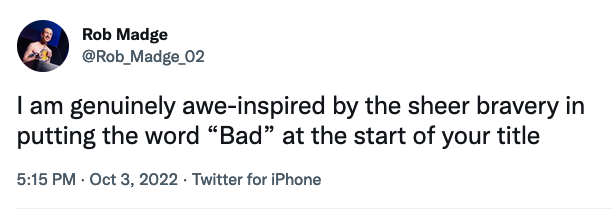
Another commentator Lee Seymour, who writes for Forbes, tweeted this brutal riposte to the new name:
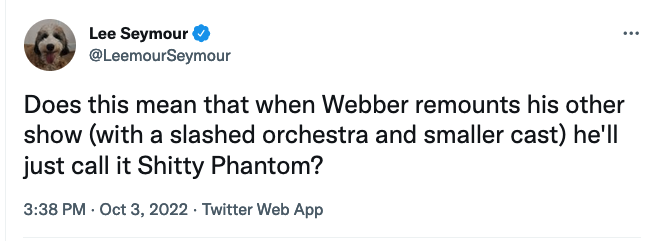
I’ll be keeping a particularly close eye on this one, as it progresses towards its Broadway opening. Can the show be salvaged? Or will there be more drama offstage than on, as there repeatedly was throughout the London run?
SEE YOU ON FRIDAY
I’ll be back here on Friday. If you can’t wait that long, I may also be found on Twitter here: https://twitter.com/ShentonStage/ (though not as regularly on weekends)
